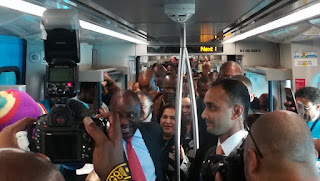Actors
are activist who has a bigger role than acting.
Roberto
Kyle says his career gives him a voice and a responsibility.
“People
go to movies and see us on TV to relate and see their stories and themselves
through us. We need to tell those stories.”
The
actor from Paarl is openly gay and plays the role of a gay-character in kykNET&Kie’s
telenovela, Arendsvlei.
According
to Roberto it took him 25 years to love who he is.
“I
fought. I still fight for my identity, for who I am and the space around me.
“I
don’t have 25 years for others to accept and love who I am.”
Roberto
was also in movies like Eye in the Sky
and The Dark Tower, as well as the
drama series Homeland.
Shortly before Arendsvlei Roberto
was seen as Skalkie Fortuin in Knapsekêrels and before that as Aunty Merle’s son Carl
Abrahams in the Marc Lottering musical.
Roberto gets serious when he says his sexuality does not determine which
type of actor he is, or that he can or should only portray a gay-character.
“It is not why I went to drama school. If I have to play a tree, then I
play a tree.”
SUPPORT
Roberto
confess he always knew he was different, and how other people made him feel
about himself.
“I
was always the target of the one or other form of bullying. Especially by boys
and simply because I was not like them. When I became a teenager, I started to
understand the dynamics of masculinity and being a man. At 13-years it all
started making sense… that I am gay.”
Even
though he is a friendly, full of life person, there was some challenging times.
In
his matric year he opened towards school friends about his sexuality.
“I
was scared of who I am. When I told my school friends they started crying,
because they have been waiting the whole time on me just to be happy for me. I
then told my sister, and that same evening my mom. Both was, and they still are
very supportive.”
Roberto
now partially regrets the whole “coming out”.
“I
believe no one should endure the trauma young boys and girls go through with
the whole ‘coming out’ process. My sister never had to hide her love (for
someone else) or explain her existence. Why should I?”
There
is another thing that Roberto regrets. His dad passed away in 2013, to cancer
and they never had the opportunity to talk about Roberto’s sexuality.
“I’m
sure he knew. Before I “came out of the closet” my parents were busy getting a
divorce and my dad moved out. I just didn’t want to still disturb him with this
news. I know that he loved me, and he supported me.
“Still
there is a part of me that feel I lack something that would make me a good son
for him,” an emotional Roberto adds.
There
is no shortage of love and support for Roberto from his mom – who raised him
and his sister with faith, determination, acceptance and humility.
He
is aware though many others are not that lucky.
“It
breaks your heart if your loved-ones don’t accept and support you for who you
are. Know that your identity and potential is not linked to any person, who
rejects your presence. Just be who you are.
“My
dad’s passing taught me we should love each other unconditionally, while we
still with each other.”
AWARENESS
On
the work front it seems Roberto and his character have a lot in common.
 His
character Lee-Roy is like Roberto also Ronel (played by Melanie du Bois) his
mom’s everything. There is another thing. We got to know Lee-Roy when he was
bullied on school. Roberto was bullied on primary and high school.
His
character Lee-Roy is like Roberto also Ronel (played by Melanie du Bois) his
mom’s everything. There is another thing. We got to know Lee-Roy when he was
bullied on school. Roberto was bullied on primary and high school.
An
honest Roberto says he was not only bullied by learners on school, but even
teachers.
“Bullying
takes on any form. It is not only to lift your hand. It is also people’s
actions, words or even a simple look you give someone. On school I was bullied
by teachers, about my sexuality and because I was different.
“I
can recall two incidents where I was bullied. One being on high school when a
teacher shouted, ‘stop being so gay’. I got up and walked out of the class. “Some
classmates and myself went to the principal’s office, where I asked that the
teacher be addressed for discriminating against me.”
Roberto’s
mom was called in and it later came out, according to Roberto, that the teacher’s
daughter is lesbian, and it appears as if the teacher took out her personal
feelings and homophobia on Roberto.
“We
need to point out homophobia, especially adults. We give permission if we
pretend there is no injustice against other, or ourselves.”
Roberto
reckons bullying on school is being address, but we all have a responsibility.
He
is of the opinion victims should be given a bigger voice and more awareness.
Like
he’s doing with his Arendsvlei-character.
Roberto
says he almost immediately got the rol when he went for the Arendsvlei
audition.
“I
was wondering if it would be a challenge to play a schoolkid and what message I
might be telling with that. When I read about the character and the big topic
he’s taking on, I knew I wanted to play the role.”
Roberto
says it was an adjustment to go from Skalkie, who walks with a firearm in Knapsekêrels,
to Lee-Roy with schoolbooks.
“There
are still people who recognize me as Skalkie, but I think many are getting used
to Lee-Roy. I just don’t want Lee-Roy to become each to play.”
BE
YOURSELF
 What
makes Lee-Roy so much fun is that he is quirky, friendly and likeable and he
bring humor to every situation. From social media Roberto also successfully
touch on the homosexuality topic and from the messages many of his supporters
see him as a role-model.
What
makes Lee-Roy so much fun is that he is quirky, friendly and likeable and he
bring humor to every situation. From social media Roberto also successfully
touch on the homosexuality topic and from the messages many of his supporters
see him as a role-model.
“It
is difficult to play a gay character on South African TV. I open myself to the
public and all the risks that comes with that.”
Hy
feels he has a responsibility to tell the truth. It is part of my goal to tell
the story of my people.
“Whether
it is sexuality, coloured, manly, Paarl or South African narrative.
“Irrespective
if I play a straight, gay or asexual character. Lee-Roy is not who I am in
life, it is the story I am telling now.”
Roberto
is one of the youngest actors to play a gay-character on our TV-screens.
He
is also one of a few, possibly the youngest, to openly talk about his own
sexuality.
“I
enjoy the reaction and messages from supporters and try to respond to everyone.
“Jinne
but then I read some of the commentary and I think Rihanna don’t pay attention
to rude and negative commentary, why should us plebs.”
The
young man views all criticism as constructive, it helps him to be a better
actor and person.
“I
ask myself if I will be creative and live out my character if I’m only going to
focus on negative comments.
“What
concerns me is that I should not hurt people with my character.”
Roberto
is aware it comes with the industry for him to be scrutinize and the backlash
that can come from the public.
“It
is a sad fact that a subject like homosexuality is still half taboo in our
society. There is room to change that and it starts with something as simple as
a conversation.”
Roberto
did his thesis on the classification of the queer identity in the entertainment
industry.
He
says it often happens that gays bully each other.
“Gay
culture is judging feminine men. The culture draws this from the heteronormativity
rules of a relationship between a man and a woman, and the role of each in a
relationship.
 “It
derives from the rooted homophobia, because gays have a view of what the
perfect man should be and how he should act. If you don’t meet the standards of
what a gay man should be, you judged.
“It
derives from the rooted homophobia, because gays have a view of what the
perfect man should be and how he should act. If you don’t meet the standards of
what a gay man should be, you judged.
“Where
people are marginalized things are always sensitive, but actors can be a voice
to address the topics.”
Roberto feels strongly if
people irrespective race, class or sexuality are only seen as a person, who
also have a story with successes and challenges, there is respect.
“People are scared to talk
about homosexuality, because they don’t understand it. Aggression comes because
people don’t want to talk about it and when someone comes out of the closet,
especially if it is in your home, it is a problem.
“Some say you can only be gay
from a distance, but when it is in your house it is a different case.”
A serious Roberto adds “people
don’t always respect that you as a person have a right to express yourself, and
how you feel.”
Our interview took place as
the scenes of the Arendsvlei-matric camp was shot. Everyone loves Lee-Roy, and
not because he is gay or being bullied, but because he is so sincere.
Ever since the barn-scenes
there has been chemistry between Lee-Roy and Wesley (played by Craig Adriaanse)
and viewers have been waiting and begging for a kiss between the two.
Will there be a kiss, will the
two date?
 “LOL” is Roberto’s reaction to
the question.
“LOL” is Roberto’s reaction to
the question.
“For three days a week Arendsvlei
tells the stories of our people, by our people. No one came from abroad. Every
day stories are being highlighted and things that are still taboo for some are
now in our homes.”
Roberto hopes that viewers
learn from Lee-Roy to take ownership of their life, to fight for what they
believe in.
“I hope especially the gay,
lesbian, transgender boy or girl learn from this that their sexuality doesn’t
determine who they are and that they so much more.
“Be true to yourself and know
no ones has a right to say who and what you are. You have ownership of your
identity and no one can take that.”
The young actors mention he
takes it with a pinch of salt how people and especially other gays judge him.
“I am not going to lay awake
at night and don’t have time to wonder how others feel about my existence. It
is important that I am who I am, me!”
Roberto gives his killer smile
and says: “There is nothing as powerful as someone who can walk in a room and
just be themselves, without having to defend their identity!”
- An edited version of this was published in Afrikaans in Kuier of 6 March 2019




























